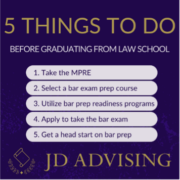February 2021 Uniform Bar Exam Predictions
February 2021 Uniform Bar Exam Predictions
Our February 2021 Uniform Bar Exam predictions as well as suggested essays to review, can be found below.
Note: for 2021 specifically, it is difficult to make predictions. This is because the February 2021 bar exam will follow a series of fall bar exams, which have never occurred in the past! Thus, we strongly urge you to study all subjects and highly tested topics. The good news is you can review all of the highly tested topics for each subject for FREE in our free MEE guide here! (We also have an additional MEE guide on how to study for the MEE here!)
If you have money to invest, we highly recommend our MEE one-sheets and our MEE seminar. These are two of our best selling products!
February 2021 Uniform Bar Exam Predictions
A reminder of how to use these predictions…
Most examinees use these predictions the correct way — they review the subjects, and the topics/essays we suggest reviewing (coming soon). This is the best way to make use of these predictions because you are not relying on them and yet you are also making sure you are studying issues ripe for testing.
Some examinees (a very small percentage!) rely on them. They only review the subjects below. They memorize the predicted subjects and depend on them. Then they email us right after the bar exam with a review of our predictions. Let us remind you that this is not advisable.
With that in mind, here are the Uniform Bar Exam predictions—both for the MEE and the MPT.
February 2021 Multistate Essay Exam Predictions
1. Corporations & LLCs (update: not tested, Agency and Partnership was instead!)
Corporations & LLCs was last tested in September 2020. This subject is often tested every other administration, so it is likely to be tested in February 2021. In 2020, every exam tested at least one type of business association (agency, partnership, corporations, LLCs). The last predominantly Corporations-focused question appeared on the bar exam in July 2020, and it targeted shareholders’ rights. So, it is likely that the Examiners may test other issues in lieu of these (e.g., LLCs, direct versus derivative actions, piercing the veil, a shareholder’s right to inspect corporate records, and rules concerning directors’ meetings).
We recommend taking a look at the following MEEs, all of which are available for free on the NCBE Study Aids website:
- February 2012 (Directors’ meetings)
- July 2012 (LLCs; direct versus derivative actions; piercing the LLC veil)
- July 2015 (Duty of loyalty, duty of care)
Note: Your review should NOT be limited solely to the essays listed above!
2. Criminal Law and Procedure (update: not tested)
Criminal Law and Procedure was last tested in September 2020, however, this question was strictly testing Criminal Law (murder in the first degree, voluntary manslaughter, defense of others). This makes it more likely that the focus of an upcoming question will slant more heavily toward to Criminal Procedure. However, keep in mind that in the past, Criminal Procedure has been tested by itself or at times, in conjunction with Criminal Law or Evidence.
We recommend taking a look at the following MEEs, all of which are available for free on the NCBE Study Aids website:
- July 2011 (Fourth Amendment; Fifth Amendment Miranda warnings)
- February 2014 (Double jeopardy; Sixth Amendment right to a jury trial)
- July 2014 (Sixth Amendment right to counsel; Fifth Amendment Miranda warnings)
Note: Your review should NOT be limited solely to the essays listed above!
3. Real Property (update: Tested!)
The Examiners favored testing Real Property in 2020 as it appeared on the MEE three times! Real Property questions can often be challenging and last year was no exception. Some of the newer issues tested last year included fixtures and the Fair Housing Act of 1968. Real Property essays tend to be more open-ended in nature and more nuanced. Make sure to analyze the facts in each paragraph of the fact pattern carefully. If the question is open-ended, it is best to organize the question around the issues and go in chronological order or around each party’s rights.
We recommend taking a look at the following MEEs, all of which are available for free on the NCBE Study Aids website:
- July 2011 (Easement creation; recording act)
- February 2012 (Easement creation and termination; future advances)
- July 2013 (Implied warranty in properties sold by a builder; warranty deed; taking a home “subject to” the mortgage versus assuming the mortgage)
- February 2015 (Adverse possession; warranty deed)
Note: Your review should NOT be limited solely to the essays listed above!
4. Secured Transactions (update: Tested!)
Secured Transactions was last tested in July 2020. As this subject is typically tested every two administrations, it is ripe for testing. Secured Transactions essays are of varying difficulty. As the most recent essay was more straightforward, we would not be surprised if an upcoming essay question focused on some more nuanced areas of law.
We recommend taking a look at the following MEEs, all of which are available for free on the NCBE Study Aids website:
- July 2012 (Buyer in the ordinary course; perfection as to proceeds; perfected secured party has priority over an unperfected party)
- February 2014 (Attachment; priority: first to file or perfect; buyer not in the ordinary course of business)
We also recommend taking a look at some more recently tested MEEs, all of which are available for free on the Minnesota State Board of Law Examiners’ website:
- February 2016 (Attachment; buyer in the ordinary course of business; perfection as to proceeds; PMSI in consumer goods; consumer-to-consumer transaction)
- July 2016 (Fixtures; fixture filings; default and foreclosure via self-help)
Note: Your review should NOT be limited solely to the essays listed above!
5. Torts (update: not tested)
Torts was last tested in February 2019. As it did not appear on any of the bar exams in 2020, Torts is ripe for testing. Torts is generally tested by itself or occasionally, it is combined with Agency. Some of the common issues tested in Torts include negligence; negligence per se; strict products liability; vicarious liability; and battery.
We recommend taking a look at the following MEEs, all of which are available for free on the NCBE Study Aids website:
- February 2011 (Battery; strict products liability; eggshell-skull rule; vicarious liability)
- February 2012 (False imprisonment; negligent infliction of emotional distress; vicarious liability)
- February 2015 (Negligence per se; vicarious liability and indemnification)
- July 2015 (Negligence: premises liability; attractive nuisance; comparative vs. contributory negligence)
Note: Your review should NOT be limited solely to the essays listed above!
6. Wills (Decedents’ Estates)/Trusts (update: Decedents’ Estates was tested!)
The Examiners generally alternate between testing Decedents’ Estates and Trusts, but occasionally they test both subjects together. In 2020, one administration featured a crossover, another question solely tested Wills, and another essay question only tested Trusts. Thus, any of these combinations are likely. Wills and Trusts essays can be quite nuanced and challenging. It is also good to be mindful of the differences between common law, the Uniform Probate Code and the Uniform Trust Code,
We recommend taking a look at the following MEEs, all of which are available for free on the NCBE Study Aids website:
Wills
- February 2011 (Insurance proceeds; incorporation by reference; anti-lapse statute; abatement)
- February 2012(Codicil; incorporation by reference; ademption; distribution of stock; slayer statute)
- July 2012 (Adopted children; children born out of wedlock) [Note: tested with Conflict of Laws)
- February 2015 (Revocation of will; pretermitted child; interpretation and analysis of state statute)
Trusts
- July 2012 (Termination of a trust; class gifts)
- February 2013 (Amendment of a trust)
- February 2014 (Future interests; Uniform Principal and Income Act;
- July 2015 (Duties of the trustee)
Note: Your review should NOT be limited solely to the essays listed above!
Wildcard: Contracts (update: Tested!)
In selecting our wild card subject, we were debating between Contracts and Civil Procedure. Contracts was last tested in September 2020 and is generally tested every other administration or consecutively. While Civil Procedure used to be tested on nearly every exam, it only appeared on one exam in 2020, which was quite surprising. Given this shift, we eventually opted for Contracts. But that does not in any way mean that we recommend ignoring Civil Procedure. Every subject is fair game for testing and Civil Procedure is guaranteed to show up on at least the Multistate Bar Examination (MBE).
We recommend taking a look at the following MEEs for Contracts, all of which are available for free on the NCBE Study Aids website:
- February 2011 (Offer and counteroffer; promissory condition; expectation damages; punitive damages)
- February 2013 (Insecurity; anticipatory repudiation)
- July 2013 (Contract formation; Statute of Frauds)
- July 2014 (Modification of common law contract and UCC contract; economic duress defense)
Note: Your review should NOT be limited solely to the essays listed above!
As a reminder, please review all of the highly tested topics for each subject for FREE in our free MEE guide here! (We also have an additional MEE guide on how to study for the MEE here!)
If you have money to invest, we highly recommend our MEE One-Sheets and our MEE Seminar. These are two of our best selling products!
Please review our recent video covering the highly tested MEE topics. (To see these in written form, review our free guide, One-Sheets, or MEE Seminar handout!). This is a good sample of how our MEE seminar goes — except our MEE seminar handout comes with two pages per subject and the lecture is closer to three hours. It is a great overview of the highly tested MEE topics and topics ripe for testing and gets excellent feedback every time.
February 2021 MPT Predictions
On the February 2021 MPT, you will have to complete two tasks if you are sitting in a Uniform Bar Exam jurisdiction. This is worth 20% of your overall bar exam score. The Examiners typically want to see whether students can write both persuasively and objectively. Therefore, it is much more common for students to see one objective task and one persuasive task. Check out our predictions for the February 2021 MPT below.
1. Objective Memo (update: tested!)
The objective memo and persuasive brief make up almost 70% of all tasks tested during the last fifteen years. The objective memo was last tested in October 2020. However, the Examiners typically test objective memos on consecutive administrations, so we would not be surprised to see this task appear in February 2021.
If you are unfamiliar with how to format an objective memo, take a look at our post on how to format an objective memo on the MPT. It is a good idea to know how to format an objective memo because usually formatting instructions are not provided on the exam.
To get some practice with objective memos, we suggest that you complete a few tasks under timed conditions to figure out your strengths and weaknesses. We recommend taking a look at the following MPTs, all of which are available for free on the Supreme Court of Georgia’s Office of Bar Admissions website:
- July 2016: In re Whirley
- February 2017: In re Ace Chemical
- July 2019: Estate of Carl Rucker
2. An Opinion or Demand Letter (update: not tested, it was a persuasive brief)
After the objective memo and the persuasive brief, the next most common MPT tasks are opinion letters and demand letters. The last time examinees were asked to write a letter was in September 2020. We think that if you are asked to complete an objective memo for one of the tasks on the February 2021 MPT, the other task will most likely be a letter – either a demand letter or an opinion letter.
Opinion letters are generally written to clients. They provide an objective view of the possible courses of action available to them. If you are feeling unsure about this task, check out our post on how to draft an opinion letter. Demand letters generally ask the recipient of the letter to take a particular action, thus it is a persuasive task. If you are looking for tips, take a moment to read our post on how to format a demand letter.
To get some practice with letters, we suggest that you complete a few tasks under timed conditions to figure out your strengths and weaknesses. So, we recommend taking a look at the following MPTs, all of which are available for free on the Supreme Court of Georgia’s Office of Bar Admissions website:
- July 2014: In re Linda Duram
- July 2015: In re Bryan Carr
- February 2016: Miller v. Trapp
Note: Again, we want to emphasize that you should not rely solely on these predictions! You should take the time to review all of the commonly tested tasks on the MPT (objective memo, persuasive brief, demand letter, opinion letter) in addition to a few uncommon tasks. It is also worth it to review our free MPT One-Sheet, our MPT Guide, and our MPT Seminar if you need extra guidance.
If this is a section of the exam that you struggle with, we recommend practicing MPTs early on and each week!
A few thoughts on the fall bar exams…
The fall bar exams were recently released and we had a few general notes on these exams. We posted a few things we thought were interesting below.
- Civil Procedure was only tested on one of the three fall exams (October 2020). This is a big change from it being a virtually guaranteed subject on every MEE.
- Torts was not tested at all! For this reason, we believe it may be coming up.
- Conflict of Laws was not tested at all. (This is not super surprising since it is the rarest subject. But worth noting!)
- Constitutional Law was tested on each exam in some capacity. On the July 2020 exam, it was combined with Corporations (a strange crossover!). It was tested on its own on the September 2020 and October 2020 exam. (Moderately difficult takings and free speech issues were tested.)
- A reason for the delay in predictions was we were not sure we had all of the essay questions that were administered. But, as it turns out the October 5-6 exam used three of the same questions tested on the September 30-October 1 exam. We were wondering if the NCBE would repeat questions given that many jurisdictions forbade examinees from sitting for multiple fall exams but we were honestly a little surprised to see that they did! This was truly a consequence of COVID, the spontaneous addition of bar exams in the fall, and the fact that the October 5-6 exam was not a “real” “Uniform” bar exam. We are not likely to ever see exact MEE questions repeated again.
We have a few helpful new MEE videos if you are looking for some additional MEE guidance.
Note: Examinees should not rely on these predictions. These predictions should merely help you ensure that you do not leave any subjects/topics out of your studying!
Looking to Pass the Bar Exam?
Free Resources:
- 🌟Bar Exam Free Resource Center: Access our most popular free guides, webinars, and resources to set you on the path to success.
- Free Bar Exam Guides: Expert advice on the MBE, the MEE, passing strategies, and overcoming failure.
- Free Webinars: Get insight from top bar exam experts to ace your preparation.
Paid Resources:
- 🏆One-Sheets: Our most popular product! Master the Bar Exam with these five-star rated essentials.
- Bar Exam Outlines: Our comprehensive and condensed bar exam outlines present key information in an organized, easy-to-digest layout.
- Exclusive Mastery Classes: Dive deep into highly tested areas of the MBE, MEE, MPT, and CA bar exams in these live, one-time events.
- Specialized Private Tutoring: With years of experience under our belt, our experts provide personalized guidance to ensure you excel.
- Bar Exam Courses: On Demand and Premium options tailored to your needs.
- Bar Exam Crash Course + Mini Outlines: A great review of the topics you need to know!
🔥 NEW! Check out our Repeat Taker Bar Exam Course and our new premier Guarantee Pass Program!







We just got the February 2021 MEEs and MPTs from the National Conference of Bar Examiners. We are aiming to have our post ready by Monday! :) Thank you for asking!
Any predictions for the July 2021 UBE?
Thank you so much!
Are there any predictions for how makeup exam questions generally go? Texas is offering a makeup exam because of power outages and lack of water recently. Not sure if the predictions change in this type of situation or they test the same topics.
Edward, we truly went back and forth about Civil Procedure. That was the hardest decision we made this round.
I look at all three of the Uniform Bar Exams this summer/fall as being treated equally — so they all go into the prediction of what would be tested next. (The only bar exam that I am honestly kind of ignoring is the October 5-6 exam, since it was not considered a “Uniform Bar Exam” and since the essay portion was the same as the September 30-October 1 exam.)
I don’t have a real reason to ignore the September (9/9-9/10) or October (9/30-10/1) exams in making the predictions! They contained standard MEE/MPT exams just like any other Uniform Bar Exam.
However, this is why we also ask people to study ALL of the highly tested topics — because we have never had fall bar exams before — so it is hard to know the exact amount of weight these will be given. Thanks for your input, Edward!
Ashley: It seems, from your response, the driving factors in your prediction are the September and October exams.
Wouldn’t the July & Feb bar exam be the main exam and thus, be the driving factors for the Feb 2021 exam predictions? I.e. – Corps (tested in July) Real property were tested twice (Feb 2020 & July 2020), Evidence (Feb 2020 & July 2020), neither Contracts nor Civil Procedure were tested in July.
With that said, wouldn’t Civ pro & Contracts be more likely on the exam than Real Property? If Wills & Trust were on the July bar, why would it be on the Feb bar?